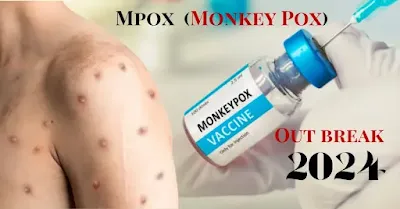Mpox (Monkeypox) in 2024
In 2024, Mpox, Once known as monkeypox, experienced a resurgence, marked by the emergence of a new variant and a significant increase in cases across Africa and beyond. This comprehensive overview of the current situation was provided, including the characteristics of the virus, the affected regions, public health responses, and implications for global health.
Virology and Transmission
The monkeypox virus is responsible for Mpox and spreads through close contact with infected individuals or animals. That includes physical contact, sexual transmission, and exposure to contaminated materials. In April 2024, a new variant known as Clade Ib became recognised in the Democratic Republic of the Congo (DRC). According to the belief, this variant is more likely to spread among humans, Particularly through sexual contact, Associated with lesions primarily on the genitals, complicating diagnosis and increasing the risk of silent transmission.
Current Outbreak Status
The World Health Organization (WHO) has reclassified the mpox outbreak as an acute grade 3 emergency due to the rapid geographical expansion and rising case numbers. This classification underscores the need for urgent public health interventions.
The WHO is coordinating efforts to enhance vaccination access and containment measures, requiring significant funding to support these initiatives.
Global Situation
As of August 11, 2024, there have been 14,654 reported cases and 517 deaths across 15 countries, primarily in Central and West Africa.
The WHO reported that new cases of the mpox strain, all linked to the outbreak in the DRC, had been identified for the first time in four East African nations: Burundi, Kenya, Rwanda and Uganda.
The first cases outside of Africa were reported in Sweden and Pakistan in mid-August 2024, linked to travel to affected areas.
Democratic Republic of the Congo (DRC)
The DRC has been the hardened hit, with 14,091 cases and 511 deaths as of August 11, 2024.
With limited access to testing in rural areas, only 24% of clinically compatible (reported as suspected) cases in the DRC have been practical in 2024, with a positivity of around 65% at the national level.
The confirmed case counts underestimate the valid burden due to limited testing capacity.
Geographic Outspread
South Africa: South Africa reported two additional confirmed cases in August 2024, bringing the total to 24 cases since May 2024. Most cases involve men who have sex with men (MSM) and individuals living with HIV
Democratic Republic of the Congo: The DRC remains the epicentre of the outbreak, with ongoing transmission and a high burden of illness. The majority of cases are among children under 15, who represent a significant proportion of fatalities.
New Cases in East Africa: For the first time, four East African countries—Burundi, Kenya, Rwanda, and Uganda—reported mpox cases linked to the outbreak in the DRC. All sequenced cases from these countries belong to a clade.
Central African Republic: An outbreak was declared on July 30, 2024, in Bangui, with reports of families hiding infected relatives due to stigma, which increases the risk of further transmission.
Côte d'Ivoire: In July 2024, Côte d'Ivoire confirmed two non-fatal cases, marking the first reported cases since the start of the multi-country outbreak year 2022. By early August, three health districts had confirmed six types.
Public Health Response
The World Health Organization (WHO) formally recognised the escalating outbreak as a public health emergency of international concern in August 2024. This designation reflects the urgent need for enhanced testing, vaccination, and treatment options in affected regions.
Vaccination Efforts
Despite the urgent need for vaccines, access remains limited. The Africa Centres for Disease Control and Prevention estimates that 10 million doses are needed to combat the outbreak effectually, yet Only a portion of this is secure. Vaccination campaigns are crucial, especially for high-risk populations, including sex workers and MSM.
Stigma and Awareness
The outbreak has highlighted the need for public health initiatives to combat the stigma associated with mpox. Many individuals fear seeking treatment due to societal perceptions, which can hinder effectual contact tracing and containment efforts. Awareness campaigns are essential to encourage individuals to seek help and reduce transmission rates.
Implications for Global Health
Experts warn that the current mpox outbreak bears similarities to the early days of HIV, with the potential for rapid spread beyond Africa. The emergence of clade Ib and its association with sexual networks raises concerns about its impact on vulnerable populations, particularly children and those with compromised immune systems.
What is mpox (monkeypox)?
Mpox, formerly known as monkeypox, is a viral zoonotic infection caused by the monkeypox virus. Through close touching, such as skin-to-skin contact, hugging, kissing, and sexual contact, it could potentially spread from animals to humans and between humans.
What are the symptoms of mpox?
Common symptoms include Fever, Headaches, Muscle aches, Swollen lymph nodes, and Rash with blisters on the face, hands, feet, body, eyes, mouth, or genitals. Symptoms typically last between 2 to 4 weeks.
How does mpox spread?
1) Mpox spreads through close physical contact with an infected person, including Direct contact with the rash or lesions.2) Face-to-face interactions.3) Skin-to-skin contact .4) Sexual contact (It can be transmitted from the onset of symptoms until the rash has fully healed)
Is there a vaccine for mpox?
Yes, there are vaccines available to prevent mpox. Close contact with infected individuals should receive the JYNNEOS vaccine as they are at high risk.
Conclusion
The mpax outbreak of 2024 presents significant challenges for public health authorities worldwide. with the emergence of a more transmissible variant and rising case numbers, the global health corps must prioritise vaccine distribution, enhance testing and treatment options, and address the stigma surrounding the disease. Continued vigilance and coordinated efforts will be crucial in controlling the outbreak and preventing further spread.











0 Comments